The post Hot Water Heater Buyer’s Guide appeared first on Carbon Switch.
]]>Hot water heaters use a lot of energy. In fact, they are the second biggest users of energy in your home (behind your space heating and cooling system).
The average American family spends $600 per year and emits about a ton of CO2 pollution to heat up water that for the most part they won’t use. That’s because conventional electric water heaters and tankless water heaters aren’t very energy efficient.
But fortunately there are ways to reduce that cost dramatically.
In fact, the average homeowner can save $300 per year by switching to a heat pump water heater. And those savings add up. Over 15 years (the typical lifespan of a water heater) the average homeowner can save $4,500. And while that’s not as much as you can save switching to a heat pump (for heating and cooling your home) it is more than you can save switching to LED lights.
But choosing a water heater is no easy task. Online information is often inaccurate and confusing.
That’s why we created this guide.
In this guide we’ll go over everything you need to know in order to pick the best water heater for your home and take advantage of those savings opportunities. We’ve also written comprehensive guides and reviews for each type of water heater:
- Heat pump water heater buyer’s guide
- Heat pump water heater reviews
- Electric water heater reviews
- Tankless water heater buyer’s guide
- Tankless water heater reviews
But if you don’t know anything about water heaters we’d recommend starting with the guide. You can think of it as your hot water heater 101 article.
How to find a water heater that works in your home
Depending on where you live you may or may not be limited by what type of hot water heaters you can buy. The two most frequent constraints are:
- The amount of space you have to house the hot water heater — If you live in a small home you may be unable to fit a large water heater tank in your home meaning a tankless option will be better.
- The type of fuel you have in your home — If you live in a home without a gas line then you won’t be able to buy a natural gas hot water heater meaning an electric option will be better.
There are other edge cases, but these are by far the two most common constraints to consider.
As a general rule of thumb, heat pump water heaters are the best option unless you don’t have the space for a tank. In that case tankless water heaters are best. We reviewed both the best heat pump (aka hybrid) water heater and the best tankless water heater.
The upfront cost of a water heater
The next thing to consider is how much your hot water heater will cost upfront. This can be broken down into two different categories:
- The unit cost — This is the cost of the actual hot water heater itself
- The installation cost — This is how much you’ll pay in labor and parts to a plumber to install your hot water heater
Costs will vary depending on what type of hot water heater you choose to go with, but here are some general rules of thumb that can be helpful in thinking of the value (i.e. cost vs. what you get) for your hot water heater:
- Type of water heater — By far the biggest influence on the price is the type of water heater you choose to buy. In terms of upfront cost, tankless water heaters are the cheapest followed by storage tanks. Hybrid water heaters and solar water heaters are more expensive upfront, but save money in the long run.
- Energy efficiency — In the hot water heater market, efficiency is everything. Generally the biggest factor in the cost of a system is going to be how much it costs to operate each year. The less it costs to operate every year (i.e. the more efficient a hot water heater), the more the unit will cost.
- Size and heating capacity — The next biggest factor is the size of the water tank (measured in gallons) or if you’re evaluating tankless water heaters the capacity of the unit (usually measured in gallons per minute). The bigger the tank or greater the heating capacity the more you’ll pay.
- Warranty and expected lifetime — The next factor that influences price is how long the product will last. The longer the warranty or expected lifetime of the unit, the more you’ll pay. In our electric water heater reviews we wrote a bit about the various options you have when choosing a warranty.
The annual cost of a water heater
In addition to the upfront cost, you’ll want to consider how much it will cost to operate your hot water heater over time. There are generally two factors that influence the operating cost:
- The cost of energy — Energy prices vary widely depending on where you live. That’s why the best water heater for someone in Hawaii won’t be the best one for someone living in Maine. Before you make your decision, check your utility bill to see how much electricity or gas costs where you live.
- Energy efficiency — The next variable to consider is the energy efficiency, also called the “energy factor” or “coefficient of performance” of a hot water heater.
If you want to understand the exact equation to determine a water heater’s energy factor, this is a good guide by the Department of Energy. But if math and acronyms like BTUs scare you, don’t worry. Every hot water heater sold must include an estimate of how much it costs to operate each year. This information is usually listed on the label in yellow like the image below.
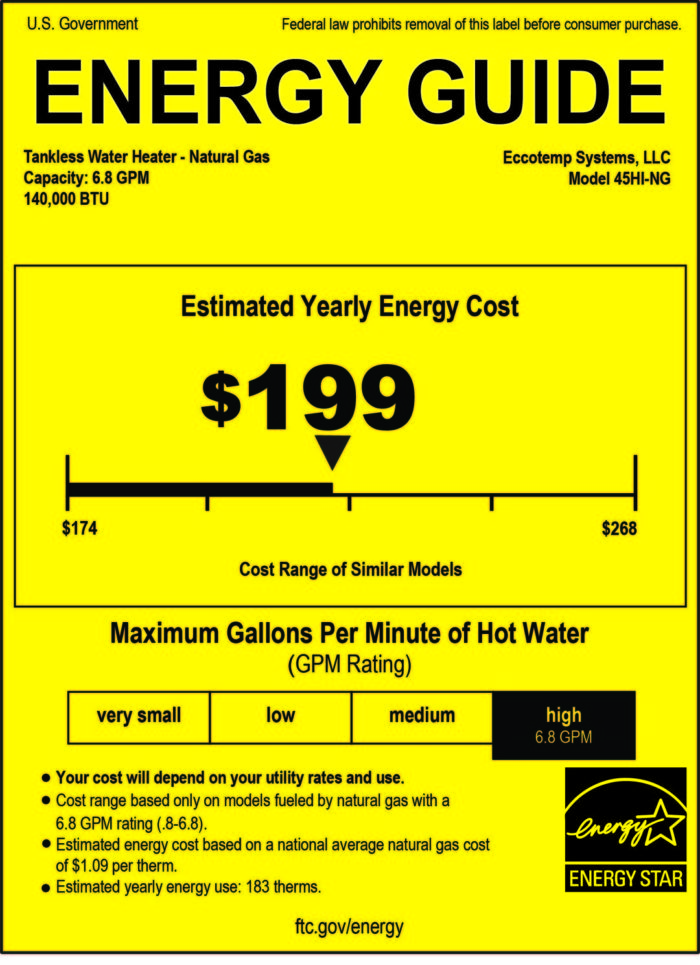
But keep in mind that these estimates are based on the average cost of energy in the United States (roughly $.12 kWh).
If you live somewhere that energy costs more than the average it will be more. If you live somewhere that energy costs less than the average it will be less.
Below is a map of electricity prices by state in America. If your state is dark purple you should expect to pay more than what is listed on the Energy Star label. If it is yellow, you should expect to pay less.
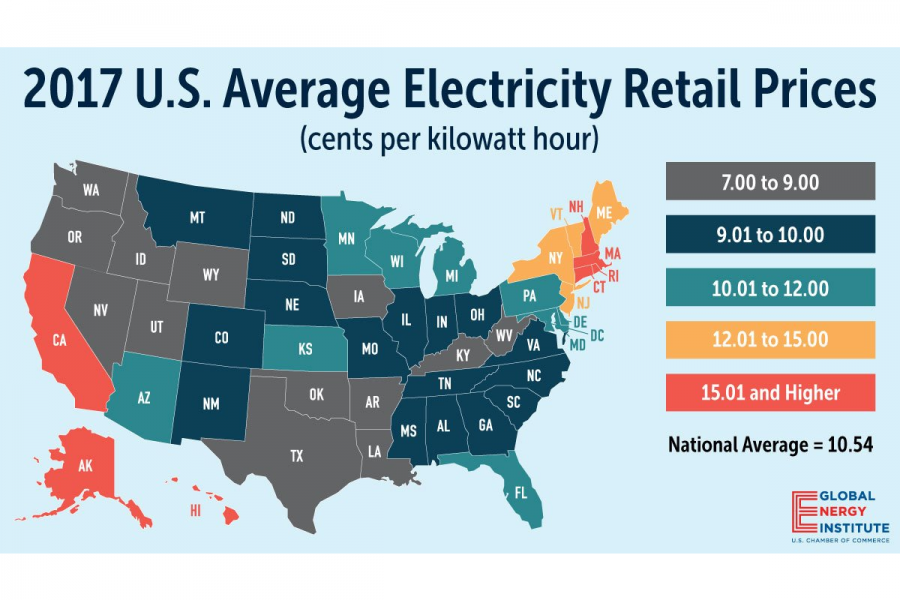
Water heater sizing guide
The next thing you’ll want to consider is how much hot water you’ll need. There are two factors that influence that:
- How many people live in your home — More people in the house means more hot showers, dishes to wash, and laundry loads.
- The maximum hot water you’ll use at one time — You’ll want to consider how many hot showers you’ll need at once or in a row and how often appliances like dishwashers and laundry machines run at the same time as the shower.
If you are buying a storage or heat pump (also called a hybrid hot water heater) the size will be in gallons. Whereas if you are buying a tankless hot water heater the size and capacity will be measured in gallons per minute (GPM).
The carbon footprint of your hot water heater
Residential energy usage is one of the biggest causes of global warming. And hot water heaters are the second most energy intensive appliance in your home, consuming roughly 20% of your home’s energy. That’s why it’s important to consider the hot water heater with the lowest carbon footprint.
And whether you think climate change is a hoax (we certainly hope this isn’t true) or whether you’re an avid environmentalist, many cities and states already regulate hot water heaters due to their energy usage. In fact, cities across the country are banning natural gas hot water heaters in new homes.
Below is a chart that shows the annual emissions based on different types of hot water heaters. As you can see storage tanks are the worst for the environment, followed by electric resistance. The numbers in parentheses represent the energy factor (i.e. the energy efficiency of the unit). So as energy efficiency rises, emissions fall.
The most environmentally-friendly hot water heater is a solar hot water heater followed by a heat pump water heater.
How to find water heater rebates and incentives
Due to the high energy usage of hot water heaters, there are many incentives and rebates to encourage consumers to buy the most efficient models. There are five different possible incentives you can receive:
- Federal government tax credits — You can receive $300 in tax credits if you buy a heat pump water heater. See more here.
- State government incentives — You may also be eligible for a rebate or tax credit from your state government. You can search for incentives in your state by going to this website.
- City government incentives — Many cities also offer rebates and tax credits for energy efficient hot water heaters. This website (linked above) will also show you city incentives.
- Utility incentives and rebates — Even your utility (or coop) may offer rebates and tax credits for a new hot water heater. To find out whether they do, search Google for your utility and the keyword “hot water heater rebate.”
- Manufacturer rebates — And lastly, hot water heater manufacturers also offer rebates to incentivize you to buy their products.
Depending on where you live this could result in $300-1,000 in savings. That’s a lot of money considering that the average hot water heater is about $1,500 to install.
But keep in mind, you’ll get the best incentives if you opt for the most energy efficient model. Many of the government and utility rebates require that you buy a model with a minimum energy factor of 2.
How to finance your water heater
The last thing to consider when buying a hot water heater is the financing options available. Of course, this part is optional. But there is one type of financing that all homeowners should at least research before making a decision. And that’s on-bill financing.
The way on-bill financing works is pretty simple. You tell your utility you want to buy a new (and more energy efficient) hot water heater and they give you the money to pay for it. Then they increase your utility bill to make their money back.
The difference between traditional loans is that it comes with little to no interest. If your hot water heater goes out, this is a good way to get some financial help to make the fix. But even if your hot water heater still works you may be able to save money each month by replacing your unit.
Assuming the energy efficiency upgrade is cheaper than the monthly payments, it’s essentially a free way to finance home improvements and cut your emissions dramatically.
Read our other energy efficiency guides for more savings tips
- LED lighting buyer’s guide
- Everything you need to know before buying a heat pump
- How to save energy with a heat pump water heater
- Electric water heater reviews
- Tankless water heater reviews
The post Hot Water Heater Buyer’s Guide appeared first on Carbon Switch.
]]>The post The Best Tankless Water Heater (Reviews) appeared first on Carbon Switch.
]]>Choosing a tankless water heater can be difficult. There are hundreds of models and brands out there and lots of industry jargon that can be hard to understand. That’s why we spent hundreds of hours reviewing the best water heaters on the market.
In past guides we’ve covered things like tankless water heater installation and cost and electric water heaters. We’ve also written about what we consider the best type of water heater available: the trusty hybrid water heater. But in this article we’ll assume you have already decided to go with a tankless water heater and want to find the best one and try to answer one question: What’s the best tankless water heater?
The best tankless water heater
We looked at every tankless water heater on the market and our favorite is the Rheem Performance 27 kw (5.6 GPM). It’s not only the best tankless electric water heater, it’s the best option overall.
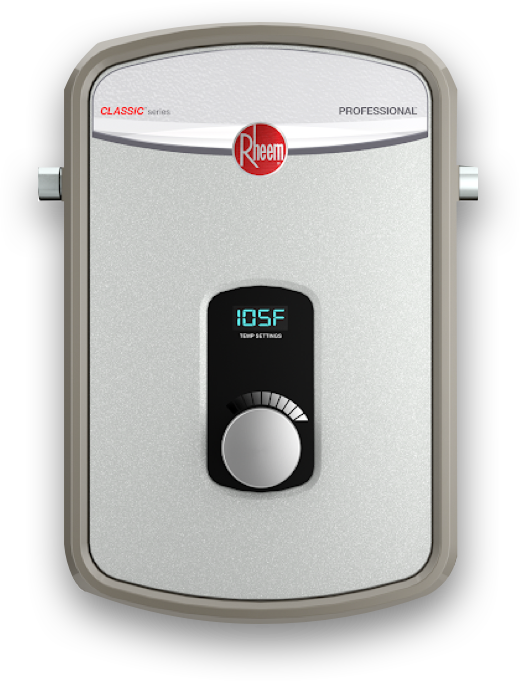
What we like
- Corrosion-resistant parts — One of the most common reasons that tankless water heaters break is because “hard water” leads to corrosion. No manufacturer warranties cover that, so it’s important to buy a water heater built with corrosion-resistant parts. And Rheem builds some of the best.
- High GPMs — The Rheem Performance tankless water heater is very energy efficient which means that even at low inlet temperatures you’ll get a lot of GPMs for a $500 water heater.
- Good value — While Rheem’s tankless water heater isn’t as cheap as EcoSmart’s models, they are still cheap relative to other brands like Stiebel making it one of the best value options out there.
To learn more about prices, installation and how to evaluate tankless (on-demand) water heaters, check out this article: Tankless Water Heater Cost

Rheem vs. EcoSmart
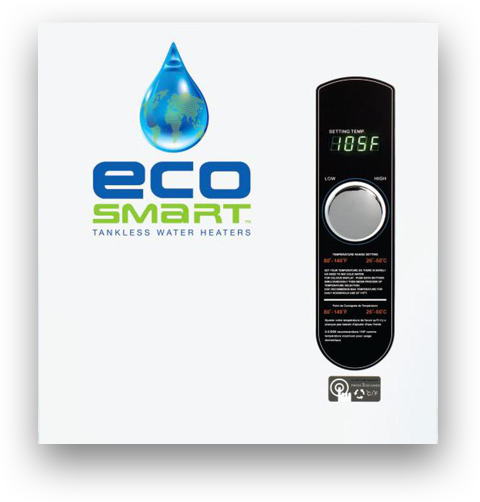
By most measures, the Rheem Performance 27 kw and the EcoSmart 27 kw are pretty similar products. Both are generally considered the best tankless electric water heaters on the market.
But there was one thing that makes the Rheem better than the EcoSmart: corrosion resistance.
“Hard” water leads to corrosion
In many American cities, water has minerals that can build up in a hot water heater and ultimately corrode the tank or other components. (You can see how hard your water is by looking at this map).
All of Rheem’s tankless water heaters are built with corrosion resistant metal, which means that they are less likely to leak due to “hard water.”
EcoSmart’s tankless water heaters by contrast are made of copper, which means they can corrode quickly. And while they claim to have a lifetime warranty, it’s important to read the fine print.
EcoSmart’s warranty doesn’t cover corrosion
EcoSmart’s warranty says: “SUCH WARRANTIES DO NOT COVER: Product failure caused by liming, sediment buildup, chemical corrosion, chlorine/chloride corrosion, or freezing.”
In other words, EcoSmart’s warranty doesn’t cover the most likely way in which it will break.

EcoSmart has bad customer service
If your EcoSmart does corrode then customer service will tell you that you should have soaked the heating components in vinegar every six months (which is quite the inconvenience).
And that’s why the internet is full of bad reviews on EcoSmart’s products like this recent Amazon review: “I wish I had never bought this product. I’ve had to replace the heater elements twice in about 3 years at cost of about $250 for the parts ($85 for 2 elements) plus labor for each incident. I have sunk about a $1,000 into this unit and more failures are to come.”
Rheem’s tankless water heaters aren’t perfect. But they receive consistently higher ratings than EcoSmart tankless water heaters. And that’s largely due to their build quality.
Rheem vs. Stiebel
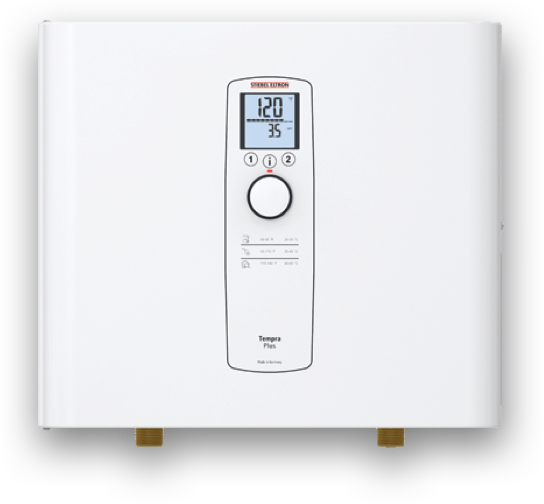
The company that claims to offer the highest quality product is Stiebel, a German-based manufacturer.
We compared the Rheem Performance 27 kw to the Stiebel Eltron Tempra 24 Plus.
At $620 the Stiebel tankless water heater is $115 more than the Rheem and $145 more than the EcoSmart.
Like the Rheem, the Stiebel Eltron Tempra is built with corrosion resistant materials. So it’s a better option than the EcoSmart.
But at a price premium of $115 we don’t think it’s worth it given that the quality is similar to the Rheem.
Best tankless gas water heater
We don’t recommend installing gas water heaters (see why below). But if you absolutely have to do it, we think the Rheem Performance Platinum 8.4 GPM is the best natural gas tankless water heater.
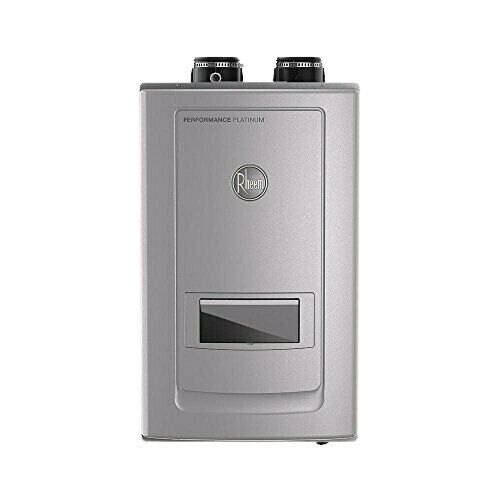
Why it’s the best option
- Water saving feature — The Rheem Performance Platinum comes with a water saving feature that can save up to 1,000 gallons per year.
- Energy efficiency — With an Energy Star rated uniform energy factor (UEF) of 0.93, Rheem’s tankless gas water heater can save $1,100 over 12 years compared to a standard gas water heater. (It’s worth noting this is much less than the $3,000-5,000 a hybrid water heater can save).
- High quality product — Rheem is one of the oldest water heater manufacturers around, so they’ve had a long time to work out the kinks in their products. They are known for high quality products and good customer service.

Why we don’t recommend tankless gas water heaters
- They’re dangerous — Gas water heaters produce carbon monoxide (CO) and nitrogen dioxide (NO2). CO poisoning sends thousands of people to the hospital each year and kills hundreds. And according to health experts, children living in homes with gas appliances are 40% more likely to have asthma.
- Gas prices are unstable and likely to rise — Natural prices can swing by as much as 100% in a given year. And most experts expect prices to rise over the next few decades. Electricity on the other hand is likely to become cheaper.
- Bad for the environment — Natural gas releases CO2 and methane, which causes climate change. Gas appliances also produce NO2, a pollutant that make air dirtier and less healthy both outside and inside homes.
A far better option for most homeowners is a heat pump water heater, which is considered the most energy-efficient water heater available.
Learn more about water heaters
We’ve written a lot about water heaters and covered everything from tankless water heater installation to what we consider the best water heaters out there: heat pump water heaters. If you still have questions check out one of those guides or if you’re interested in exploring other ways to increase your home’s energy efficiency check out our guide to heat pumps or LED lighting.
The post The Best Tankless Water Heater (Reviews) appeared first on Carbon Switch.
]]>The post Tankless Water Heater Buyer’s Guide appeared first on Carbon Switch.
]]>- When it makes sense to install a tankless water heater
- How to find the best tankless hot water heater
- How to estimate a tankless water heater cost
- Tankless water heater prices
- How to find the right size tankless hot water heater
If you’re ready to buy and install a tankless water heater check out this article: Best tankless water heater. In that article we review the best electric tankless water heater and compare prices and costs based on different brands and models. Or if you’re interested in an even more efficient type of water heater check our hybrid water heater buyer’s guide and review of the best hybrid water heater.
What are the pros and cons of tankless water heaters?
In recent years tankless hot water heaters (again, some people call these on-demand hot water heaters) have become increasingly popular in America. Compared to conventional an electric water heater, they are much cheaper to operate since they only heat water when you need it. They also take up much less space in your home than the more energy efficient hybrid water heater. However, if you are switching from a conventional tank, the installation cost will be higher.
Pros
- Cheaper to operate — Using a tankless hot water heater can save you hundreds of dollars per year. A typical 40 gallon electric water heater will cost anywhere from $200 per year for the most efficient models to $800 for the least efficient models, tankless models often cost less than $100 per year to operate.
- More environmentally friendly — Because tankless hot water heaters use less energy, they also generate less emissions. That means a lower carbon footprint. Though it’s worth pointing out that they aren’t as environmentally-friendly as heat pump water heaters (also called hybrid water heaters).
- Less space — Tankless water heaters are smaller and can be mounted on the wall, which means they can easily be stored in small laundry rooms and closets.
- Longer lasting — Tankless water heaters last about 20 years, which is 2-3x longer than conventional storage tanks.
- Safer and cleaner — Compared to a conventional tank, tankless models won’t leak a lot of water, build up Legionella bacteria, or tip over in an Earthquake. The air supply and exhaust vents are also sealed which means you don’t have to worry about gas leaks or carbon monoxide poisoning.
- Easier to winterize — Getting your tankless hot water heater ready for winter takes seconds compared to conventional tanks that take a long time to drain.
Cons
- Higher installation cost — Depending on your home, a tankless water heater may cost more to install. That’s because most homes in America have conventional electric water heaters and switching requires more labor and parts than simply replacing an old unit with the same type of heater.
- High GPM capacity models are expensive — Tankless hot water heaters are best if you don’t need to use a lot of hot water simultaneously. You can buy models that offer as much as 12 GPMs (far more than enough for a big family all showering at once), but they are expensive (~$2,500).
- Longer payback period — If your installation costs are high that means it will take longer for the monthly savings to pay themselves off. You can figure out exactly how long it will take by dividing the total cost by the monthly or yearly savings.
How much does a tankless water heater cost
The cost of a tankless water heater is usually between $1,000-$4,500. You will probably hear people talk about the total installed cost. That’s another way of saying the cost of the unit, labor and parts. This is a better way to look at it than simply looking at the tankless water heater price. Below we’ll break down those costs in more detail and help you understand a tankless water heater average cost.
- Tankless water heater price — The price of the unit itself will of course have the biggest impact on the total tankless water heater cost. The cheapest electric tankless water heater costs about $360. The most expensive models cost as much as $2,500. The factor that will influence the tankless water heater price the most is the GPM capacity. The higher the capacity, the higher the price of an on-demand water heater.
- Tankless water heater installation cost — The cost of the labor depends on how long it takes a plumber to install the unit and how much they charge (which depends on living costs in your city). According to Fixr, plumbing hourly rates range from $45-150 per hour with the average plumber charging $85 per hour. Installing an electric tankless heater should take about 2-3 hours and cost $90-450 for labor. Installing a gas tankless heater costs more — as much as $1,200 plus an additional $500-1,000 if you need to install a gas line.
- Carpenter labor (sometimes) — In rare cases installing a tankless heater requires a carpenter to do drywall work. According to Fixr, this should cost between $100-300 at an average carpentry rate of $75 per hour.
- Supplies and parts — Your plumber may need to use connectors, fittings, mounting hardware, and other parts during the install. According to Homewyse, this should cost about $50.
- Disposal — A plumber may charge beween $25 to $500 to remove your old hot water heater and dispose of it properly. (This large range is why we recommend getting multiple quotes so that you can compare each plumber and get the best deal).
For example, Fixr says that the average tankless water heater is $2,800. But keep in mind that according to the latest census, the average American home is 2,392 square feet. According to Pew Research, the average home has 2.64 people living in it. And while I don’t have any data or sources to back this up, I’d venture to say that the average plumber is going to recommend a water heater that covers every edge case and errs far on the side of more, rather than less capacity. (Plumbers make more money selling bigger units and don’t risk getting bad reviews if they install a small unit and an angry homeowner gets upset when they try running three showers at once).
Why is all that important? Because every home, person, and family is different.
As I write this, I am sitting in a 1,100 square foot home (half the average). My last apartment was 800 square feet. I live with one other person who takes showers two hours earlier than me each morning. We run the dishwasher and laundry at night (not while we shower). That means the GPMs we would need are going to be far lower than the average, which means the cost of a tankless water heater would be much lower.
While many American homes are set up for conventional tanks, yours might be set up for a tankless option which means the install cost could be a few hundred dollars. Ultimately the best way to find out the cost of a tankless water heater is to go on Google or Yelp and find a local plumber you can get a quote from.
So there’s a good chance that you could buy a $350 tankless water heater and pay a plumber $400 to install the unit (a total installed cost of $750). This is about the same cost as installing a conventional 40 gallon hot water heater. It is about $500 less than installing a heat pump water heater.
Annual operating cost of tankless hot water heater
The next thing to figure out is how much it costs to run your tankless hot water heater each month or year. In other words, how much are you going to have to pay in utilities each month or year?
The easiest way to figure this out is to look for the bright yellow Energy Star label, which will tell you how much you can expect to pay each year to operate your unit. Many manufacturers also list it in the product information. But these estimates are averages and there are a number of factors that influence your operating cost.
- Energy factor — This measures the efficiency of your tankless water heater. According to Energy Star, tankless water heaters have Energy Factors that range from 0.96 to 0.99. The higher the number, the more efficient the unit and the less money you’ll pay to operate it.
- Energy consumption / usage — If you combine the energy factor with the frequency that your tankless water heater is used, you’ll get the total energy consumption. For electric heaters, this is measured in kilowatt hours per year (kWh/yr). For gas units this is measured in therms or British Thermal Units (BTUs) per year.
Cost of energy — Once you know the expected energy consumption per year you can multiply that by the cost of energy and get the expected operating cost each year. Electricity costs are measured in cents per kilowatt hour (kWh). Natural gas costs are measured in therms, British thermal units (BTUs), and cubic feet (Ccf). If you need to convert them, you can use this calculator on the EIAs website.
Electric tankless water heaters cost between $75 and $300 per year to operate whereas gas tankless water heaters cost between $175 to $500 according to our review of the most popular models.
If you plan to use a tankless water heater for your whole home, then consider a heat pump water heater. They are the most energy efficient type of water heater and will save you thousands over their lifespan. If that’s of interest check out this article: Heat pump water heater reviews.
How to find the right size hot water heater
Sizing is a crucial factor that will determine your tankless water heater cost (both upfront and after installation). There are two factors you’ll want to consider when sizing a tankless water heater:
- Flow rate (GPM) — Tankless hot water heaters heat water instantaneously (which is why they are also referred to as on-demand hot water heaters). The flow rate measures the maximum amount of water they can heat on demand.
- Temperature Rise (ΔT) — The temperature of the incoming cold water — referred to as the groundwater temperature — determines how much energy will be needed to heat the water. Temperature rise is measured by taking the desired hot water temperature minus the incoming ground water temperature (which will vary by time of year and the place you live).
The important thing to remember is that the higher the temperature rise needed, the lower the flow rate. Almost all models will include the GPMs based on different temperature rises in the product information like the image below.
Notice that they list three things:
- A map of the inlet temperature (also called the groundwater temperature)
- The GPMs their model achieves based on different inlet temperatures
- GPMs of commonly applications (like showers and kitchen faucets)
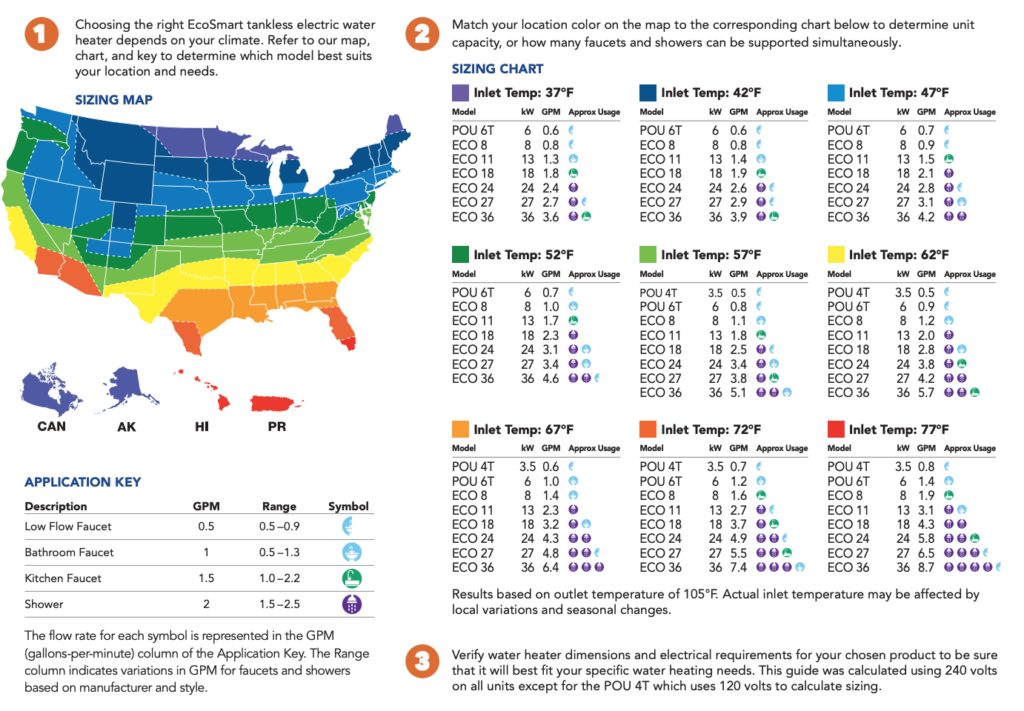
Pro tip: If you really want to be precise in your required GPM estimate, turn on the water of any fixture (a shower or sink) and fill a bucket to a 1-quart mark. Dividing 15 by that number of seconds equals gpm.
Read our reviews of the best tankless water heater and other guides
For our tankless water heater reviews article we sifting through all the online noise and marketing jargon to help homeowners find the best tankless water heater.
And if you are looking to save energy and money check out one of our other home energy guides:
- Homeowner’s guide to LED lights
- How to save thousands of dollars by installing a heat pump and how to find the best heat pump
- How to save money insulating your home
The post Tankless Water Heater Buyer’s Guide appeared first on Carbon Switch.
]]>The post Heat Pump Water Heater Buyer’s Guide appeared first on Carbon Switch.
]]>In the last few decades heat pump water heaters (HPWHs) have become increasingly popular in America. And for good reason too.
Heat pump hot water heaters — also referred to as hybrid hot water heaters — are generally considered the most energy efficient water heaters on the market. (Note: because they run on electricity, you may also hear people refer to them as electric heat pump water heaters).
As a result they are cheap to operate and have a much lower carbon footprint. Many homeowners can save $200 to $600 per year by switching to a hybrid water heater. The only two energy efficiency projects that will save you more money are replacing your heating and cooling system with a heat pump HVAC system and improving your home insulation.
They are more expensive to install than an electric water heater or a tankless water heater. But because the savings are so high these systems often pay themselves back quickly.
In the guide below we’ll cover everything you need to know before switching to a heat pump water heater. If you’re already sold on going with a heat pump water heater and want to see our recommendations on the best models and brands, check out our picks for best heat pump water heater.
How do heat pump water heaters work?
Heat pump water heaters — also referred to as hybrid water heaters — pull heat from the surrounding air to heat the water, rather than relying on electricity or gas. In other words they move energy instead of generating it. In this way, they use the same basically technology as heat pumps used for space heating and cooling.
As researchers at the Department of Energy put it, “Heat pumps work like a refrigerator in reverse. While a refrigerator pulls heat from inside a box and dumps it into the surrounding room, a stand-alone air-source heat pump water heater pulls heat from the surrounding air and dumps it — at a higher temperature — into a tank to heat water.”
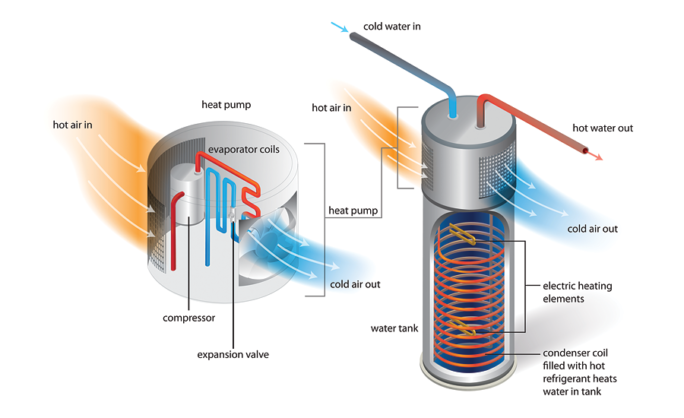
Today most heat pump water heaters also include a backup electric resistance heater in case the surrounding air temperature isn’t warm enough to use. That’s why you may hear people refer to them as a hybrid water heater.
Because they use surrounding air, heat pump water heaters need to be placed in an area of your home that remains 40º–90ºF (4.4º–32.2ºC) range year-round. They also need at least 1,000 cubic feet (28.3 cubic meters) of air space around the water heater in order to work.
Pros and cons
Pros
- Energy efficiency — With the exception of solar water heaters, heat pumps are the most energy efficient. Most of them have energy factors of at least 2 (compared to 0.6-0.98 for conventional tanks). That means you’ll spend less money on electricity each year than traditional electric water heaters.
- Environmentally friendly — Thanks to their energy efficiency heat pump water heaters are also the most eco-friendly. Their carbon footprint can be anywhere from 2-4x lower than a conventional tank. That’s why environmental groups like NRDC and RMI love them.
- Rebates and incentives — The federal government will give you a $300 tax credit for buying a heat pump. Some states like Maine will give you a $750 instant rebate. And many of the biggest utilities like Xcel will give you a $500 rebate. Visit the Database of State Incentives for Renewables & Efficiency to find which rebates and incentives you qualify for.
Cons
- More expensive upfront cost — If you live in a place that doesn’t offer incentives for heat pump water heaters, it will likely cost more upfront. That’s because units are often more expensive than electric water heaters and tankless water heaters and the installation is more complex (which means more of a plumber’s time).
- Some background noise — Some homeowners complain about a soft hum in the background when a hybrid heat pump is running. But if you install it in the right place this shouldn’t be a problem.
Upfront cost
The upfront cost of a heat pump depends on a number of factors including which unit you buy, how long it takes to install, and how many incentives you qualify for.
- Unit cost — Heat pump (hybrid) hot water heaters cost between $1,200 for 50 gallon tanks to $2,500 for 80 gallon tanks made by the highest end manufacturers. The tank size and product quality influence the unit cost most.
- Labor to install — According to HomeWyse, it should take a plumber about 6 hours and cost between $600 and $800 to install a hybrid heat pump water heater (HPWH).
- Electrician labor — If you’re replacing a conventional electric tank then you’ll already have the electric set up for a HPWH. But if you’re replacing a gas heater, you may need to bring an electrician out to run a 220 volt circuit. According to HomeAdvisor, this should cost between $132-272.
- Supplies and tools — Your plumber will need some supplies to set up your HPWH. According to HomeWyse this should cost between $172 and $218.
- Disposal cost — Some plumbers charge between $25-75 to remove old hot water heaters. But many of them do this for free.
So as you can see installing a hybrid water heater costs more upfront than smaller energy efficiency projects like installing LED lighting. But it’s still much cheaper than replacing your space heating and cooling (HVAC) with a heat pump.
Annual operating cost
The operating cost, or the expected annual cost to run your heat pump hot water heater, will depend on your heaters efficiency rating, energy costs where you live, and how much hot water you use.
Here’s what impacts the operating cost most:
- Energy factor — This is a measure of how much electricity your HPWH will need to heat your water. Most heat pumps have an energy factor of 2, which is about 2-3 times as much as conventional tanks.
- Energy consumption / usage — This is how much energy your heat pump will use each month or year. According to the Department of Energy, the average heat pump uses 2,195 kWh per year of electricity (kWh/yr). The bigger the tank, however, the more energy you should expect to use.
Cost of energy — This is how much electricity costs where you live. Electricity costs are measured in cents per kilowatt hour ($/kWh). If you live in the South where electricity is cheap you’ll pay much less than if you live in California or Hawaii where electricity is more expensive. This data by the EIA shows the average price of electricity in each state. But to get an exact number you’ll need to look at your utility bill.
The average hot water heater costs about $225 per year to operate compared to $400-800 for many conventional tank hot water heaters according to the DoE. For a family of four the average cost to run a HPWH is $300 per year compared to $600 for electric storage water heaters according to Energy Star.
Sizing guide
In order to figure out what size hybrid hot water heater you’ll need, you should look at the “first hour rating” of each model you evaluate. The first hour rating tells you how much hot water you’ll be able to use in any given hour before the tank must refill and reheat more incoming water.
Then you’ll want to estimate the maximum hot water that you and your family will use in any given hour. The way to do this is to look at the flow rate of all your end uses (showers, faucets, dishwashers, etc) and then add up the ones that you’ll use within the same hour.
The average shower uses 2 gallons per minute (with low-flow shower heads using less). If two people live in your home and take 10 minute showers back to back, then that’ll require 40 gallons of hot water.
But let’s say one of you needs to shave after your shower. The average flow rate of a sink is 0.5 gallons per minute. If it takes 2 minutes that’s another 1 gallon of capacity you’ll need.
Now let’s say you want to run the dishwasher after your shower. The average dishwasher uses 6 gallons (with energy efficient models using 4 gallons).
If you add all those up you get 40 + 1 + 6 which is 46 gallons. That means you’d probably want to get a 50 gallon tank.
But remember the bigger the tank, the more it costs. So if you wanted to save money you could elect to run the dishwasher at night and shower in the morning. Or you and your partner could take 3 minute shorter showers and only need a 40 gallon tank.
Heat pump water heaters vs. electric
Heat pump water heaters are about $800 more expensive than the cheapest conventional electric water heaters. That begs the question: is it worth the extra money?
Much cheaper operating costs
In addition to looking at the upfront cost of a water heater, it’s important to look at the annual operating cost. And this is really where hybrid water heaters shine.
That’s because water heaters generally use about 20% of your home’s total energy. Considering the typical homeowner spends between $1,500 and $2,500 per year on energy that adds up.
Heat pump water heaters are generally 4x more efficient than conventional electric water heaters. That means the average household will save about $300-400 per year.
In other words a hybrid heat pump will pay itself off in 2 or 3 years. Over 10 years it’ll save you between $3,000 and $4,000. Not bad.
Longer warranty
As you’ll see in our review of the best heat pump water heater, most models come with a longer warranty than standard electric water heaters. The warranties are also much longer than the best tankless water heater we reviewed.
For example the base Rheem electric water heaters come with a 6 year warranty. To get a 9 year warranty costs about another $100. The heat pump on the other hand comes with a 10 year warranty.
Better rebates and incentives
As we mentioned above, there are also a lot of rebate opportunities when you buy a hybrid water heater.
As of writing the federal government will give you a $300 tax credit if you buy a hybrid water heater. States like Maine will send you $750 check in the mail if you buy one. And many of the biggest utilities in the country like Xcel offer $500 rebates.
If you want to see if your city, state or utility offers incentives, visit the Database of State Incentives for Renewables & Efficiency.
Lower carbon footprint
By far the best feature of heat pump water heaters is their low carbon footprint. Other than solar water heaters — which are still prohibitively expensive in most of the United States — heat pumps are the most energy efficient water heater available.
Thanks to their high energy efficiency, the average heat pump water heater emits 4x less emissions than traditional electric models.
Heat pump water heaters vs. tankless
Many people that consider heat pump water heaters also look at tankless water heaters (note: it’s common to hear people refer to these as an on demand water heater). That’s because both are more energy efficient than conventional gas and electric water heaters. Therefore both lead to savings over the long run.
So how do heat pump hybrid water heaters compare to tankless water heaters?
More immediate capacity
The best heat pump water heaters on the market offer much more immediately hot water capacity than tankless water heaters.
Let’s say you and your family get home from a camping trip or a soccer game and everyone wants to shower at once.
If you have a heat pump water heater, no problem. The Rheem 50 gallon water heater for example can give you 4 back to back showers.
But if you bought a low GPM tankless water heater your family will likely run into problems when three of you go to shower at once.
There are tankless water heaters that offer as much as 10 GPMs, but they start to get pricey. So if you need a lot of hot water at once, the heat pump water heater is the way to go.
Lower carbon footprint
While tankless water heaters are more energy efficient than conventional gas and electric water heaters, they still can’t beat hybrid water heaters.
The average heat pump water heater emits about half as much CO2 (200 kg per year) compared to on-demand water heaters (400 kg per year). Why? Heat pump water heaters move heat whereas on-demand tankless water heaters generate heat.
Heat pump water heater vs. gas
Heat pump water heaters are without a doubt a better option for most homeowners than gas water heaters (tankless or conventional).
Safer and healthier
According to the CDC, every year 50,000 people in the U.S. visit the emergency room due to accidental carbon monoxide poisoning. Tragically, 430 people die each year from it.
One of the primary causes of CO poisoning is gas appliances like water heaters and furnaces. So if you can avoid installing these, you can avoid much of the risk of CO poisoning.
More energy efficient and environmentally-friendly.
Heat pump water heaters are the most energy efficient option on the market today. Compared to gas water heaters they use far less energy and emit less greenhouse gas emissions.
With the recent spikes in natural gas, it’s becoming clear that the fuel is an unsustainable fuel for home energy. This winter experts expect natural gas prices to be up as much as 50% higher than last winter.
Better rebates and incentives
As we mentioned above, there are also a lot of rebate opportunities when you buy a heat pump water heater. Gas water heaters, on the other hand, rarely have rebates.
As of writing the federal government will give you a $300 tax credit if you buy a heat pump water heater. States like Maine will send you $750 check in the mail if you buy one. And many of the biggest utilities in the country like Xcel offer $500 rebates.
If you want to see if your city, state or utility offers incentives, visit the Database of State Incentives for Renewables & Efficiency.
Installation
One of the biggest factors that may drive your decision is the installation process (or possibilities). We wrote a whole guide here that covers tankless water heater installation and costs. So we won’t go too in-depth here.
But heat pump water heaters can be installed just like a normal electric water heater. They are basically just more efficient versions of the standard water heater you’ve probably seen all your life. A tankless water heater on the other hand is a bit different. Generally people install them for a specific use case. For example, in a house I used to rent we had one because there were no closets big enough to fit a big tank. So our landlords stuck a tankless water heater in the small attic. Why? Because it was the only thing that would fit. Or to draw from another personal experience, a friend of mine installed one near a guest bathroom since it didn’t need much hot water. It was easy to stick in the bathroom closet and didn’t take up valuable closet space.
So as a rule of thumb here’s my recommendation: if you can do it, install a heat pump water heater. You’ll save money, energy, and the investment will more than pay itself back. If you can’t fit it or can’t afford it, then go with a tankless water heater.
But please, for my future, your children’s future, and this beautiful planet’s future, don’t install a natural gas or fuel oil water heater. If you do, you’re essentially guaranteeing dozens of tons of carbon emissions for decades to come and burning dangerous gases in your home.
The post Heat Pump Water Heater Buyer’s Guide appeared first on Carbon Switch.
]]>The post Electric Water Heater Reviews appeared first on Carbon Switch.
]]>How to find the best electric water heater
Replacing your hot water heater is an overwhelming decision and one that can be difficult to plan for. But as we showed in this hot water heater buyer’s guide, spending a bit of time to get it right can save you hundreds of dollars per year.
Below is a comprehensive review of the best electric water heaters on the market based on hundreds of hours of research and in-home testing. Our goal is to help you find the best electric hot water heater for your home.
For each brand we found the best 40 gallon electric water heater, 50 gallon electric water heater, and small electric water heater. We focused on the top-selling and most popular brands and models and reviewed the rheem electric water heater, bradford white electric water heater, and the AO Smith electric water heater.
If you’d like to compare these water heaters to other options, check out our reviews of the best heat pump water heater and our reviews of the best tankless water heater.
Best 40 gallon electric water heater
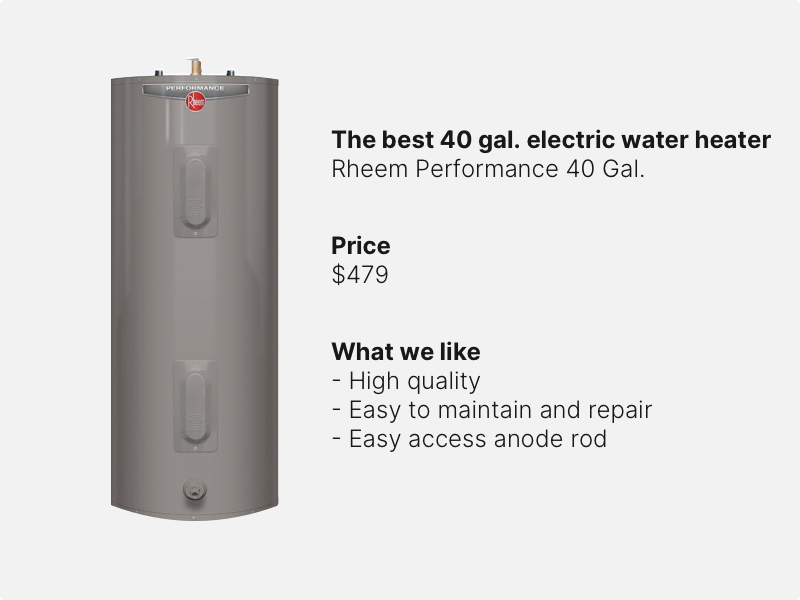
We looked at every 50 gallon tank on the market and our favorite is the Rheem Performance 40 Gal. Electric Tank Water Heater.
What we like
Price — As you can see in the table below, it is $20 cheaper than the comparable AO Smith model and $344 than the Bradford White model.
Easy maintenance — According to Brandon Baril, a plumber in San Diego, most of the Rheem heaters he repairs only take a $9 part because of Rheem’s simple smart controller design. Easier repairs means that you’ll have to replace your hot water heater less frequently and save money. Baril says that when he repairs hot water heaters Rheem units often cost his customers half the cost of competitors like Bradford White.
Easy access anode rod — This means that you can easily replace it or install a second one which can double the life expectancy of your water heater. (Here’s a good article on anode rods if you’re unfamiliar with them).
40 gallon electric water heater prices
Below is a table with 40 gallon electric water heater costs, energy efficiency ratings, annual operating costs, and first gallon ratings (FHRs).
It’s worth noting that since the pandemic began, electric water heater prices have been rising due to supply chain problems and rising steel costs. Between July 2020 and January 2022, the average price of the water heaters we track rose about 33%.
| Product | Price | Efficiency | Annual Cost | FHR |
|---|---|---|---|---|
| AO Smith 40 Gallon Electric Water | $499 | .92 | $424 | 53 gallons |
| Bradford White 40 Gallon Electric Water Heater | $823 | .95 | $405 | 56 gallons |
| Rheem 40 Gallon Electric Water Heater | $479 | .93 | $419 | 54 gallons |
The table above shows prices for base models of Rheem, AO Smith, and Bradford White. But a few other factors will affect the price:
Which height is best for your home?
One important factor to consider is the height of the water heater. Most water heater manufacturers sell three different height models:
- Tall electric water heaters — 60 inches
- Medium electric water heaters — 48 inches
- Small electric water heaters — 32 inches
Price differences will vary by manufacturer. But in the case of the Rheem Performance model we reviewed earlier, here’s the difference in cost for each model:
Tall Rheem 40 gal. electric water heater price — $479
Medium Rheem 40 gal. electric water price — $439
Short Rheem 40 gal. electric water price — $529
As you can see, there’s not a huge difference in price here. So you’ll want to pick the option that fits in your home best.
Which warranty length is best for you?
The factor that will influence price the most is the warranty length. Most manufacturers have three options: 6, 9, and 12 year warranties.
Using the Rheem water heater product warranty, let’s look at how the prices vary:
Rheem Performance 40 Gal. Medium – 6 Year — $439
Rheem Performance Plus 40 Gal. Medium– 9 Year — $619
Rheem Gladiator 40 Gal. Medium 12 Year — $739
As you can see the 9 year warranty is $180 more than the 6 year warranty. And the 12 year warranty is $120 more than the 9 year warranty. But once you get into the 12 year warranty territory you also get additional features like an auto shut-off valve and leak detection.
Ultimately whether or not you buy a warranty is a personal choice that depends on whether you want to save money or have less risk. This Old House has a great article on the value of hot water heater warranties and options here.
Best 50 gallon electric water heater
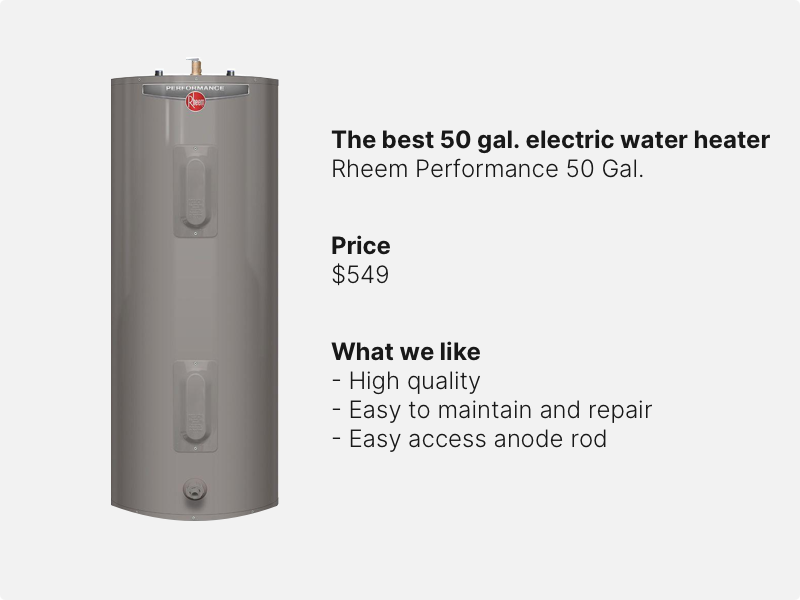
We looked at every 50 gallon electric water on the market and our favorite is the Rheem Performance 50 Gal. Electric Tank Water Heater.
This model is about $250 cheaper than the Bradford White 50 gallon electric hot water heater. And while it’s similar in price to the AO Smith 50 gallon electric water heater, we think the Rheem wins on other features (see below).
There’s no doubt: Rheem’s are well-built water heaters. As the oldest hot water heater company in America, Rheem has had a long time to work out their product issues. Their tanks are thicker and less likely to leak. Their products use less wires making it simpler to install and repair. And generally their products last longer.
One of Rheem’s biggest selling points is the accessibility of their anode rod. This is important because it means when the rod goes out, you can repair it easily without replacing the entire hot water heater, saving you hundreds of dollars. You can also install two anode rods to effectively double the lifespan of your hot water heater.
Rheem Performance customer review
“One of the features I really like about this model is the easy access to the anode rod and that the rod is made of magnesium. In my BW water heater the anode rod was in the hot outlet port and wasn’t accessible without cutting the copper pipe and removing it, so I never changed it. That is not good for protecting the tank from corrosion. When I removed it after taking out the heater it was completely used up.”
50 gallon electric water heater prices
| Product | Price | Efficiency | Annual cost | FHR |
|---|---|---|---|---|
| Rheem Performance 50 Gallon Electric Heater | $549 | .93 | $420 | 61 gallons |
| AO Smith 50 Gallon Electric Water Heater | $549 | .92 | $424 | 62 gallons |
| Bradford White 50 Gallon Electric Water Heater | $793 | .95 | $405 | 64 gallons |
The table above shows prices for base models of Rheem, AO Smith, and Bradford White’s 50 gallon electric hot water heaters. But, as we mentioned in the section above on 40 gallon water heaters, a few other factors will affect the price:
The height — tall vs. medium vs. short electric water heaters
Most manufacturers have a few different height options which gives customers more options that will fit their home. Below is a comparison of Rheem’s tall, medium and short options and their prices:
- Tall (~60 in.) — $539
- Medium (~48 in.) — $519
- Short (~32 in.) — $529
Ultimately the most important thing is that you find a water heater that fits in your home and offers the amount of water your household needs. So if you need to cram your water heater in a small space, spend the extra money to get a short model. Otherwise, try and opt for the medium since it is the cheapest and has a similar tank size to the tall.
If a short electric hot water heater seems to small for the space you have in mind we’d also encourage you to consider a tankless water heater, which is ideal for fitting in small spaces. To compare prices and costs, you can check out these tankless water heater reviews.
Warranty length — 6 year vs. 9 year vs. 12 year
The warranty length has a big impact on prices. Most manufacturers offer three different options to customers: 6 year, 9 year, and 12 year warranties.
Once again we’ll use the Rheem water heater warranty information as our baseline and look at how prices vary depending on the warranty length.
Rheem Performance 50 Gal. Medium – 6 Year— $519
Rheem Performance 50 Gal. Medium – 9 Year — $699
Rheem Gladiator 50 Gal. Medium – 12 Year — $849
In this case a 9 year warranty will cost an additional $180. And the 12 year option will be another $150 (or $330 more than the base model).
But again when you buy the longer warranty you get a few extra features. The Performance plus (9 year) comes with an LED display (certainly nothing to write home about!). And the Gladiator comes with auto shut-off and leak detection which could save you some money and home damage.
As I mentioned above, I think warranties are personal decisions that depends on your preferences. Some people like lower prices, while others like peace of mind.
Most energy-efficient water heater
While this article was dedicated to the best electric hot water heater, the truth is that none of these models are as good as a heat pump water heater (also known as a hybrid water heater). That’s because a conventional electric water heater relies on outdated technology that results in hundreds of dollars of wasted energy every year. Heat pump water heaters on the other hand are more efficient and environmentally friendly. To learn how to save hundreds of dollars per year (and $5,000 over the lifetime of the appliance), check out this article on the best hybrid water heaters.
The post Electric Water Heater Reviews appeared first on Carbon Switch.
]]>The post Heat Pump Water Heater Reviews appeared first on Carbon Switch.
]]>The Best Heat Pump Hybrid Water Heater
Replacing your water heater is an overwhelming decision and one that can be difficult to plan for. From an electric water heater, to a tankless water heater, to a hybrid hot water heater, and more, there are many options out there. But it’s a decision that could save you—or cost you—thousands of dollars down the line. In fact, switching to a hybrid water heater can save you as much as $4,800 over the next 10 years.
We spent hundreds of hours looking for the best heat pump water heater on the market when we wrote our buyer’s guide. Read below to see our heat pump water heater reviews and what models we liked best.
Our favorite: Rheem Performance Platinum
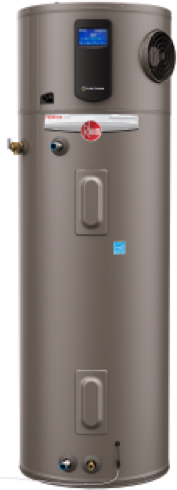
We looked at every heat pump hybrid hot water heater on the market and our favorite is the Rheem Performance Platinum.
Lowest upfront cost
Rheem vs. AO Smith: The Rheem Performance Platinum is the cheapest heat pump water heater on the market at $1,672 for a 40 gallon tank and $1,699 for a 50 gallon tank. That’s $127 cheaper than the AO Smith Signature Premier and $383 cheaper than the Bradford White AeroTherm.
But for that extra $127 and $383 neither the AO Smith or the Bradford White come with any additional features. In fact, Bradford White’s AeroTherm model is less energy efficient and noisier than the Rheem.
Highest energy efficiency
If you look at the energy efficiency of these models you’ll see that the Rheem heat pump water heater wins on that front as well. Their Performance Platinum model has an energy factor of 3.75 compared to AO Smith’s 3.45 and Bradford White’s 3.39. That will lead to savings of about $10-15 per year. That’s nothing to write home about. But considering the Rheem is also the cheapest model, it’s the best bang for your buck.
Quietest background noise
The Rheem Performance Platinum is also known for being the quietest heat pump water heater on the market. It runs at 49 dB (a low hum) compared to AO Smith’s 51 dB and Bradford White’s 55 dB.
Runner up: AO Smith Signature Premier
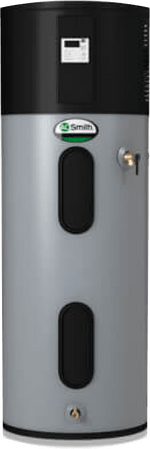
In our opinion the second best heat pump water heater is AO Smith’s Signature Premier.
Upfront cost
When we first published this review in 2020, AO Smith’s heat pump water heaters tied Rheem for the cheapest model. But since then AO Smith got more expensive than the Rheem.
AO Smith’s 50 gallon model starts at $1,799, which is $127 more than the Rheem. But AO Smith’s heat pump water heater is $256 cheaper than Bradford White’s heat pump water heater reviewed below.
Energy efficiency
Looking at the energy efficiency, an AO Smith hybrid water heater comes in second with an energy factor of 3.45 (compared to Rheem’s 3.75 and Bradford White’s 3.39).
Now it’s worth mentioning that the difference between an energy factor of 3.75 and 3.45 isn’t huge. If your plumber loves AO Smith, it’s probably not worth harassing them to install a Rheem. But it will result in a bit higher energy bill (probably about $10-20 each year).
Second quietest background noise
Background noise is another important consideration for heat pump water heaters. And here the AO Smith also comes in second at 51 dB.
Again, the difference between 51 and 49 dB isn’t very big. So it’s probably not worth picking the Rheem over the AO Smith just because it’s 2 dB quieter. But compared to the Bradford White, the AO Smith is 4 dB quieter. That difference isn’t massive either. But considering the Bradford White is more expensive, it’s worth going with the quieter option.
Overpriced: Bradford White AeroTherm

Coming in last place is the Bradford White AeroTherm. If you read any of the sections above, you’ll already know why we think the Bradford White heat pump is the worst option on the market.
More expensive
At $2,055 for a 50 gallon heat pump water heater, the Bradford White is $383 more expensive than the Rheem and $256 more expensive than the AO Smith.
Shorter warranty
You’d expect that for another couple hundred bucks the Bradford White would come with a longer warranty. But that’s not the case. In fact, it’s 4 years shorter than the Rheem and the AO Smith’s 10 year warranties.
If you want a 10 year warranty you’ll have to shell out another $299 bringing the total cost $2,384 ($329 more than the AO Smith and Rheem heat pump water heaters).
Harder to find in stores
Bradford White hot water heaters are notoriously hard to buy as a homeowner. That’s because unlike Rheem and AO Smith that sell their hot water heaters at Home Depot and Lowe’s, Bradford White only sells their water heaters through supply houses and plumbers.
Other heat pump water heaters we reviewed
In addition to the heat pump water heaters we reviewed above, we also looked at the following models.
Rheem ProTerra Hybrid Water Heater
- Price: $1,916 (for a 50 gal. tank)
- Energy factor: 3.75
- Annual cost: $105
- Warranty length: 10 years
The ProTerra is Rheem’s top of the line heat pump water heater. But when we reviewed it, we discovered that it wasn’t much better than the cheaper Performance Platinum model.
For $200 more you get the same energy factor, annual operating cost and warranty length. The only thing they add with this model is a leak detection and auto-shut off feature.
Stiebel Eltron 58 gal. Heat Pump Hybrid Electric Water Heater
- Price: $2,499
- Energy factor: 3.05
- Annual cost: $125
- Warranty length: 10 years
Stiebel Eltron is a German hot water heater manufacturer known for their high quality. But when we reviewed their heat pump model we found little reason to justify the $2,499 cost.
At an energy factor of 3.05 it is less efficient than Rheem, AO Smith and Bradford White’s models.
The only reason we could come up with is… it’s pretty cool looking. I mean look at that beauty.
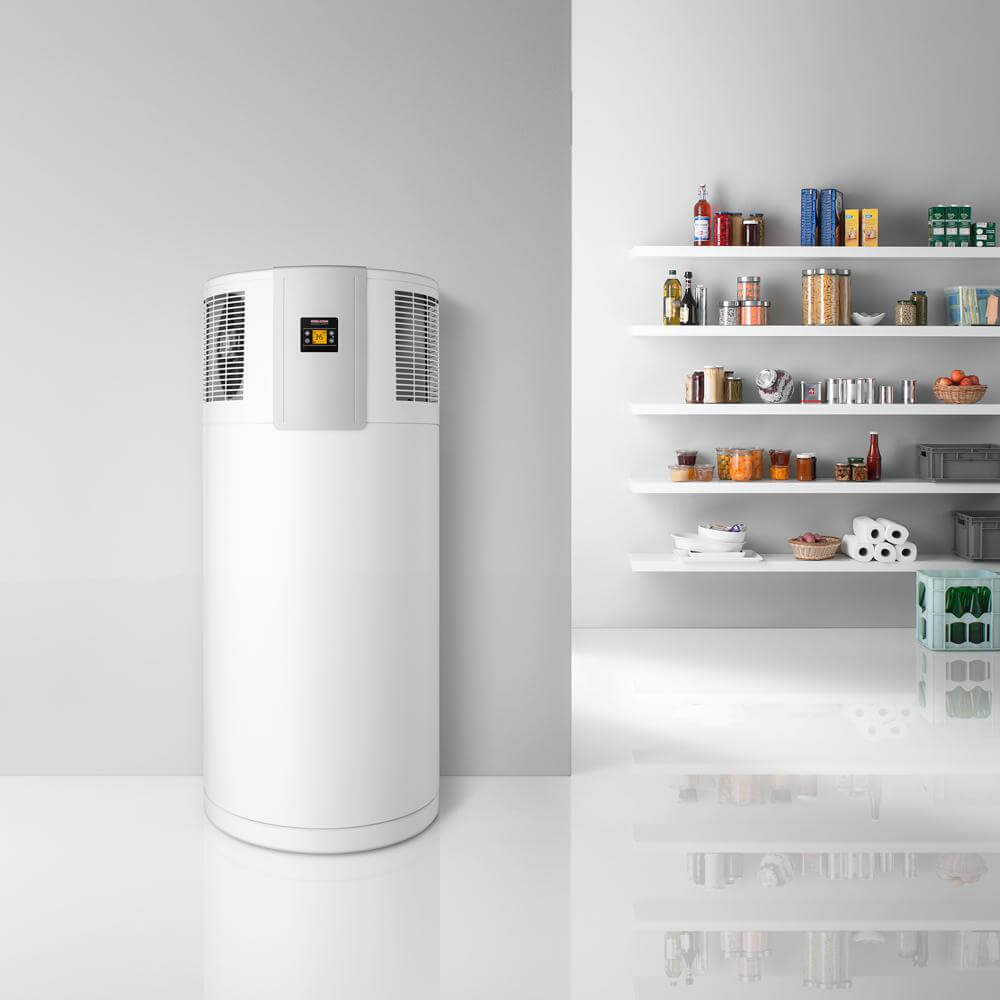
Ruud, State and GE heat pump water heaters
And last, but not least, we tried to review the GE GeoSpring hybrid electric water heater, the Ruud heat pump, and the State heat pump. But all of them have been discontinued or bought by AO Smith, Rheem, and Bradford White.
The post Heat Pump Water Heater Reviews appeared first on Carbon Switch.
]]>